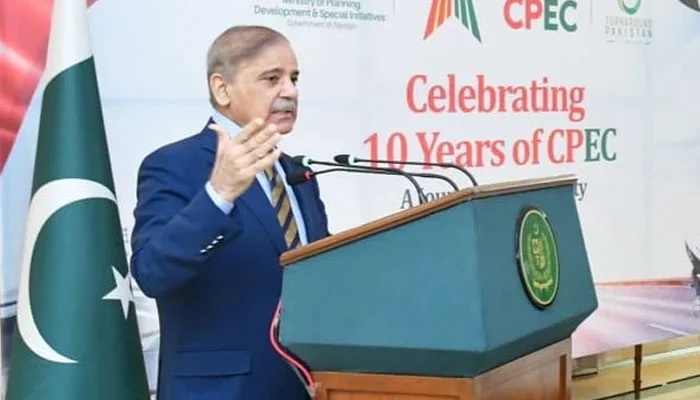Prime Minister Muhammad Shehbaz Sharif has recently asked neighboring India to take advantage of the mega project instead of creating obstacles in its way. While highlighting the significance of the project, Premier noted that the CPEC is a magnificent plan to connect not only regions/ areas but also people’s hearts, whereas, Iran, Afghanistan, the Middle East, and the whole region would also benefit from this vast infrastructure. The Prime Minister vowed to double the pace of the development as it was not only for improving roads, rail, seaports, and air routes, but it would mobilize mass public participation in healthcare, education, and skill development in the country.
The China-Pakistan Economic Corridor (CPEC), is a magnificent example of China-Pakistan all-weather strategic friendship and an important element of Chinese President Xi Jinping’s vision for global peace, friendship, and economic partnership that manifests in the form of the Belt and Road Initiative (BRI) across Asia, Africa, and Eurasia. Initiated in late 2013, the CPEC has completed a decade of successes, and achievements by creating a network of ground and sea lines of communication, energy projects, Special Economic Zones, industrial and trade revival, skill development, healthcare, education, and cultural exchanges through people to people contacts between the two nations. Historically, it was a game-changer initiative that was aimed at bringing a pivotal change in geopolitical and geoeconomic dynamics in the region, however, this grand endeavor fell victim to global conspiracy and regional rivalry at its early stage. The United States of America, its Western allies, and Pakistan’s staunch enemy India formed an alliance to fail CPEC which they perceived as a part of Beijing’s broader strategy for global supremacy in the world.
The CPEC has been publicized as a game-changer and a pivotal shift in regional alliances, trade, and economic partnerships throughout East Asia to the Middle East, Central Asia, and North Africa that was a strategic and economic advantage of Pakistan, but the successful completion of BRI and CPEC projects could expand Beijing’s political, economic and military influence over a large part of the world. As for as India is concerned, New Delhi opposed the CPEC because it passes through Gilgit Baltistan and Azad Kashmir which is falsely claimed by India. In addition to this, CPEC’s success could propel China to superpower status along with enabling Pakistan to become a stronger military and economic power in the region, which is totally unacceptable to New Delhi. Based on those grounds, New Delhi and Washington left no stone unturned to fail the China-Pakistan Economic Corridor, while the Indian Intelligence agency created a dedicated desk and allocated billions of rupee fund to wage propaganda and terrorist activities to sabotage CPEC projects and create confusion/ doubts regarding Chinese investment in Pakistan. In fact, the rise in the separatists’ insurgency in Balochistan, the resurgence of terrorism in Erstwhile FATA, and continuous support to miscreants/anti-state elements in Gilgit Baltistan had been the main pillars of RAW anti-CPEC policies over the past decade.
Interestingly, the Chinese government has several times invited New Delhi to join CPEC to grasp lucrative economic, trade, and social dividends of regional connectivity and cooperation but India always declined such offers due to its vested interests and traditional rivalry with Beijing and Islamabad. Apparently, Prime Minister’s pledge regarding India’s inclusion into the CPEC is inappropriate because New Delhi has played a saboteur role against the CPEC from the day first. India has joined the Western bloc and its interests are completely aligned with Europe and America. Today, India is a close non-NATO ally of the United States and Washington is propping up New Delhi to counterweight Beijing’s Influence in the region and beyond. Presently, hundreds of American tech giants, businesses, and multinational firms had shifted their businesses from China to India because of political reasons, ease of doing business, availability of cheaper workforce, and raw materials. However, Pakistan’s interests are best protected by its close partnership with Beijing and its policy of non-alignment and refrain from bloc politics.
The PML-N has a long history of love for India, it always advocated for the promotion of Pak-Hind better ties and collaboration in trade and business. Historically, this policy had proved to be counterproductive for Pakistani leaders particularly the PML-N leadership because of opposition from the military establishment. Although, regional cooperation is in the best interests of both nations if India gives a positive response to those good gestures. Over the past two decades, India remained resolute in Pakistan’s enmity and did not move an inch from its stated policy on multiple issues ranging from cricket matches to the Kashmir dispute, Sir Creek, or Siachen. How Mr. Sharif aspects a breakthrough amid ongoing rivalry and CPEC’s staunch opposition from New Delhi. In fact, Prime Minister must pursue Pakistan’s policy of playing a bridging role between China and the United States. Currently, US leadership is endeavoring hard to repair its ties with Beijing and Sharif must offer Pakistan readiness to play a peace broker role between the two powers as Islamabad did in the past. Pakistan should invite the US to join CPEC, to get easy access to the Chinese market and collectively harvest the benefits of this multilateral joint venture. If it happens, New Delhi will surely obey its Western masters. However, it will only be possible when Pakistani leaders will shed off haphazard policies and demonstrate courage in defending Pakistan’s core interests at the global level.







